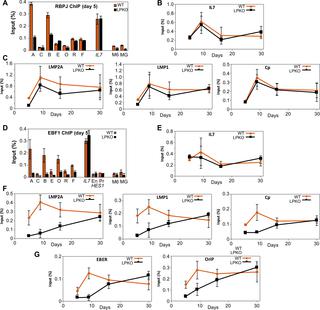PLoS Pathogens ( IF 6.7 ) Pub Date : 2018-02-20 , DOI: 10.1371/journal.ppat.1006890 Agnieszka Szymula 1 , Richard D Palermo 1 , Amr Bayoumy 1 , Ian J Groves 1 , Mohammed Ba Abdullah 1 , Beth Holder 2 , Robert E White 1

|
The Epstein-Barr virus (EBV) nuclear antigen leader protein (EBNA-LP) is the first viral latency-associated protein produced after EBV infection of resting B cells. Its role in B cell transformation is poorly defined, but it has been reported to enhance gene activation by the EBV protein EBNA2 in vitro. We generated EBNA-LP knockout (LPKO) EBVs containing a STOP codon within each repeat unit of IR1. EBNA-LP-mutant EBVs established lymphoblastoid cell lines (LCLs) from adult B cells at reduced efficiency, but not from umbilical cord B cells, which died approximately two weeks after infection. Adult B cells only established EBNA-LP-null LCLs with a memory (CD27+) phenotype. Quantitative PCR analysis of virus gene expression after infection identified both an altered ratio of the EBNA genes, and a dramatic reduction in transcript levels of both EBNA2-regulated virus genes (LMP1 and LMP2) and the EBNA2-independent EBER genes in the first 2 weeks. By 30 days post infection, LPKO transcription was the same as wild-type EBV. In contrast, EBNA2-regulated cellular genes were induced efficiently by LPKO viruses. Chromatin immunoprecipitation revealed that EBNA2 and the host transcription factors EBF1 and RBPJ were delayed in their recruitment to all latency promoters tested, whereas these same factors were recruited efficiently to several host genes, which exhibited increased EBNA2 recruitment. We conclude that EBNA-LP does not simply co-operate with EBNA2 in activating gene transcription, but rather facilitates the recruitment of several transcription factors to the viral genome, to enable transcription of virus latency genes. Additionally, our findings suggest that EBNA-LP is essential for the survival of EBV-infected naïve B cells.
中文翻译:

爱泼斯坦-巴尔病毒核抗原 EBNA-LP 对于转化幼稚 B 细胞至关重要,并促进转录因子向病毒基因组的募集
爱泼斯坦-巴尔病毒 (EBV) 核抗原前导蛋白 (EBNA-LP) 是 EBV 感染静息 B 细胞后产生的第一个病毒潜伏期相关蛋白。它在 B 细胞转化中的作用尚不清楚,但据报道它在体外增强 EBV 蛋白 EBNA2 的基因激活。我们生成了 EBNA-LP 敲除 (LPKO) EBV,其中包含 IR1 的每个重复单元内的终止密码子。EBNA-LP 突变的 EBVs 从成人 B 细胞以降低的效率建立淋巴母细胞系 (LCL),但不能从感染后大约两周死亡的脐带 B 细胞建立。成人 B 细胞仅建立具有记忆 (CD27+) 表型的 EBNA-LP-null LCL。感染后病毒基因表达的定量 PCR 分析确定了 EBNA 基因比例的改变,并且在前 2 周内 EBNA2 调节的病毒基因(LMP1 和 LMP2)和 EBNA2 非依赖性 EBER 基因的转录水平显着降低。感染后 30 天,LPKO 转录与野生型 EBV 相同。相比之下,EBNA2 调节的细胞基因被 LPKO 病毒有效诱导。染色质免疫沉淀显示 EBNA2 和宿主转录因子 EBF1 和 RBPJ 在招募到所有测试的潜伏期启动子时被延迟,而这些相同的因子被有效地招募到几个宿主基因,表现出增加的 EBNA2 招募。我们得出结论,EBNA-LP 不仅与 EBNA2 合作激活基因转录,而且促进了几种转录因子向病毒基因组的募集,从而使病毒潜伏基因转录成为可能。此外,


























 京公网安备 11010802027423号
京公网安备 11010802027423号